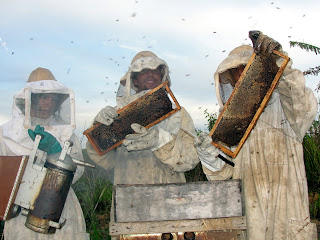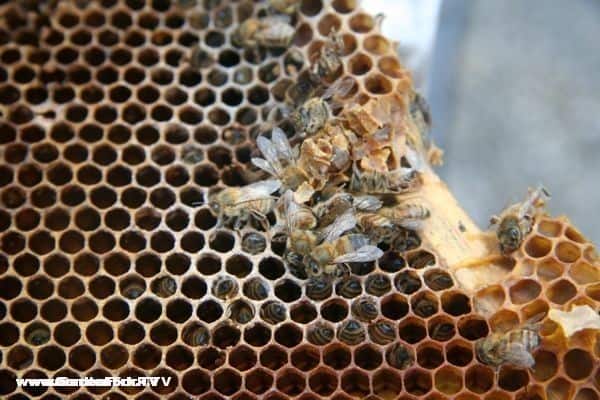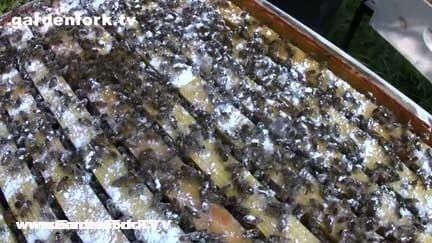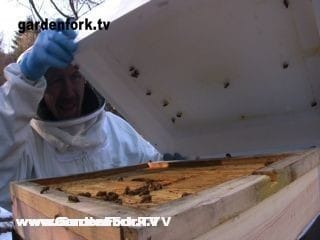can and does provide a home for bees,including pre Colombian stingless bees,that sugar cane monoculture kills.
..................................................
http://lynnadventuringabroad.blogspot.com/2010/01/sugarcane-bees-and-agrarian-reform.html
Friday, January 22, 2010
Sugarcane, Bees, and Agrarian Reform
What do sugarcane,bees,and agrarian reform have in common you ask? Well that is what I set out to discover on my recent week in the field. For my research on the impacts of sugarcane ethanol production on rural livelihoods in Northeast Brazil, I have decided to conduct a case study of one municipality in the sugarcane-producing Northern Forest Region of Pernambuco. In this rural municipality, Tracunhaém, the majority of the land is dedicated to producing sugarcane on large-scale plantations; the sugarcane is turned into sugar and ethanol in factories located on the plantations themselves. Such large-scale sugarcane production has persisted in the region since the sixteenth century, when colonial Brazil became an important producer and exporter of sugar for Europe. For over three hundred years the production was driven by brutal slave labor, and while in the century and a half since abolition the system of labor on the plantations has changed significantly, slavery and quasi-slavery still exists, and even where it doesn't, the sugarcane-producing regions are some of the most impoverished in this highly unequal country.
Brazil, a nation with the world's tenth largest GDP, one of the world's highest levels of concentration of land and wealth, and therefore one of the most highly unequal societies. Here, I can dine on excellent sushi in an air-conditioned restaurant with my friends who own nice cars and live in luxurious condos, and the next day help another friend tend to her two goats (i.e. her bank account on hoof) after a lunch of homegrown cassava and beans in her 12" x 12" adobe hut. And this is precisely how I live here, between the two worlds that coexist in this corner of Brazil.
However, the focus of my research is not inequality or the contrasts between the up-and-coming urban middle class and the rural poor, although it is of course highly related to my research, as it is related to virtually all phenomena in Brazil. The ethanol that fueled my friend's car to take me out to sushi could easily have been produced by the sugar-ethanol factory whose plantation butts up against my friend with the goats' family farm. Just last week I saw the damage done to nearly a third of their small farm when the fire set to the sugarcane plantation got out of control and went onto my friend's land, burning a number of fruit trees and a large pineapple crop. As a rural peasant who fought against that sugarcane baron for six years for her right to own land to farm, she knows very well just how powerful he is and that filing any sort of complaint about the damage will get her at best nowhere, and at worst hurt or in trouble. That's Brazil, folks. And this is the "green" fuel that is lauded the world over.
My friend Ena and her mother on their farm (the part where fruit trees are still standing, untouched by the fire)
Ena with her bank account
So back to the story of sugarcane, bees, and agrarian reform, and my week doing fieldwork in the rural municipality of Tracunhaém. I chose this municipality as my case study in part because I had already begun to develop relationships with people there, and also because I think that as one slice of pie out of the whole sugarcane-producing Forest Region, Tracunhaém seems to encompass many of the typical ways of life and relationships that exist there. In other words, I hope that by studying this municipality I can to some extent speak to the conditions throughout the region, thereby providing a useful portrait of how rural livelihoods in the sugarcane-producing region are affected by sugar-ethanol production, and how an increased demand for ethanol in Brazil and internationally might affect their lives and those of future generations, as well as people who are currently landless and seeking to realize their right to own and farm land via agrarian reform. Where do the bees come in? Keep reading. You may even get to see yours truly in a bee keeper's suit.
For my week in the field I headed to an agrarian reform settlement where I had stayed on previous shorter trips. An agrarian reform settlement is a rural community of previously landless people who occupied land that was privately owned by a large landowner (in this region that means sugarcane plantation owners), and after years of struggle, camping out in tent cities, facing violent evictions and intimidation, the land was eventually expropriated and divided up amongst the settlers so that each would have around 23 acres of land upon which to farm, have a home, and make a living off the land. The land is only expropriated if it meets the National Institute of Colonization and Agrarian Reform's (INCRA) qualifications for being considered "unproductive" and/or not meeting social and environmental regulations of land use. Of course meeting those qualifications does not mean that it is automatically expropriated. It takes years of the landless occupiers and the NGOs and social movements that support them lobbying INCRA. It usually takes 5-8 years for the land to be expropriated to the landless, thereby realizing their right to land and ensuring that Brazilian land is productive and fulfilling its social function.
The community I stayed in, we'll call it NC, is one of these settlements. Its residents are mostly people who previously lived on the impoverished outskirts of small poor cities throughout the region, renting small homes, selling their labor on the sugarcane plantations, and barely scraping by. Most of them had lived on sugarcane plantations during the period when the plantation owners housed their workers on-site, or they lived on small farms near the plantations. But with the value of sugarcane increasing, and plantation owners only wanting to intensify and increase their production, most small farms in the area have been bought out and plantation owners have evicted their residents/workers. This has of course caused cities throughout the region to swell with people from the countryside. This phenomenon occurs throughout Brazil, which explains the millions of people in favelas and the millions that have joined the landless movement in search of a dignified life in the countryside, where they can make a living as a small farmer.
I had already made numerous contacts in NC through the Brazilian NGO that I am collaborating with. I was welcomed there by my new friends, who have also become invaluable informants, contributing their wealth of knowledge about life in rural Pernambuco, both on and off the sugarcane plantations. During my week in NC I stayed in families' homes, ate with them, chatted with them, went to their farms with them, watched novelas with them, and asked lots and lots of questions about their lives. I conducted informal interviews with nine community members, filmed, and took hundreds of pictures. I also went to a nearby community, BO, which is not an agrarian reform settlement. BO is another alternative for those people who left the land in past decades but didn't want to live on the outskirts of cities. BO is a small rural town where a plot for a tiny house can be bought cheaply. Located in the middle of a sea of sugarcane plantations, in BO around 90% of men work either cutting cane or performing some other service on the plantations. No one in BO owns enough land to even plant a garden in. They go to the city on the weekends to buy all of their food. When the sugarcane harvest ends (it only lasts 6 months, meaning most families only have steady income 6 months of the year), BO residents enter the hungry season. The government provides assistance with buying basic food stuffs and cooking gas. Only those households with a family member who has employment outside of the sugarcane plantation escapes the hardship of those 6 months. I conducted interviews with 8 community members in BO to learn more about their lives, which are in many ways drastically different from those on the agrarian reform settlements. One thing I learned is that the conversion of the old sugarcane plantations that had become unproductive into agrarian reform settlements has actually helped the residents of BO. While sitting fallow, those plantations provided no employment and produced no food for local communities like BO. Now that that the agrarian reform settlers have converted the plantations into small diverse farms, many BO residents work for part of the year on the farms in exchange for money and/or food that they help to plant and harvest.
One of my informants from NC, Espedito, is an enthusiastic farmer and artisinal beekeeper and honey producer. While many of my new friends here are extremely passionate about their work and lives as small farmers (not to mention as revolutionaries, which is what they truly are and what many of them consider themselves to be after occupying and fighting for land for 6 years), Espedito's passion is above and beyond most others. He is currently conducting numerous "experiments" on his farm, seeking ways to make it more productive, while maintaining its diversity and adhering to the "agroecological" methods of farming promoted by the landless movement. Yes, as it turns out, the landless movement is pro environmental conservation and sustainable agriculture as well. Its opposition to large-scale agricultural is not only framed in terms of social justice; it is also about living sustainably off the land, living well, and reducing dependency on agribusiness. What's all this about the rural poor being one of the main drivers of environmental destruction? Come visit my friends in Pernambuco and they'll show how their takeover of the land from sugarcane barons has led to diverse, carbon-rich farms combining standard small-scale agriculture with agro-forestry, reforestation of the almost totally devastated Atlantic Forest on parts of their settlement, and preservation of ground and surface water sources. They take pride in being the only farmers at their local market to sell organic fruits and vegetables.
Espedito, working hard
On Espedito's farm, numerous acres are dedicated to an agro-forestry experiment, where he is letting native vegetation grow in amongst his fruit trees (papaya, banana, passionfruit, guava, jackfruit, and many more), and has planted several native species throughout. He also has an organic vegetable garden and medicinal plants garden for his family's use, all fertilized with his experimental home-made organic fertilizer, the secrets of which cannot be revealed here. ;) His latest experiment is his fish ponds, where he is attempting to raise tilapia and one native Brazilian species. He took an interest in raising fish in part because it has less of an impact on the land than raising livestock. Under the hot sun Espedito excitedly gave me a tour of the farm, and sent me off with a bag full of fresh fruit and an invitation to harvest honey with him the next day.
That's me, suited up and ready to harvest some honey.
Of course I took him up on the honey offer! The next day Ena, Espedito, Espedito's nephew Charles, and I all got suited up and headed out to harvest honey at his 15 bee boxes spread across the 23 acre farm. When I had initially accepted the offer I hadn't really been thinking about what it would feel like to be covered with bees. We've all seen video footage of those guys in bee suits covered in hundreds of bees, and most of us (however not scared of bees we may claim to be) have probably thought that we would never be caught dead doing that, right? Yes, I was one of those who never liked the idea of being covered in bees, protective suit or not. Once I got into the astronaut-like suit in the middle of the afternoon, however, I found myself suddenly more concerned with the heat than the bees. Maybe it was the adrenaline that kept me from collapsing from heat stroke. Or the fact that I felt like above all I needed to keep up with this crew of hard-core farmers that I had gotten myself into this adventure with. In order to be able to film and photograph part of the experience, Charles gave me a pair of yellow rubber dish-washing gloves (as opposed to the thick canvas gloves usually worn), saying that he could not guarantee their integrity. Nice. So of all the times that my heart really got beating, it was mostly when dozens of bees started to land on my hands, and at one point one tried to sting the fuzzy velcro of my video camera strap (they're always looking for hair or skin to try to sting, I guess this felt more like part of my body than the rubber gloves). Throughout the long afternoon of honey harvesting, I found myself mostly either holding a camera, with both my hands and the camera covered in bees; carrying boxes of fresh honeycomb, with hundreds of bees following me and trying to eat the honey as I took it away; or at other times in charge of smoking out the bees (see picture at top of post- Ena on left is holding the smoke-maker), and covering others in smoke to try to get the bees away from them. One time I had to do an emergency squirt of smoke into the hole in Charles' pants, which the bees had found and mercilessly attacked. It ended up being more fun than scary, once I got used to the bees. Turns out I love bees! And I love harvesting honey!
Once we got back to the house and unsuited, far away from the bees that had followed us and were still trying to eat their honey, I had the opportunity to chat with Espedito about his new career as a beekeeper. He told me that his beekeeping and honey-making is merely "artisinal" and that he plans to keep it that way. He has a niche market; people even pulled up to his house while I was there asking to buy a liter of his honey (for those who know about it this stuff is in high demand). He enjoys raising the bees and selling their honey, and it provides a welcome boost to the rest of his farm income. However, he's not trying to get rich off the honey, that's for sure. He hopes that his entire farm will eventually become more productive, and thereby more lucrative, but he very much considers himself a small-scale agroecological farmer, and for this reason will not compromise his values to make a profit off the farm. For example, he plans to make his agroforestry system more productive, and to be able to market his organic fruits at a higher price, rather than clearing the native forest and planting a monoculture of bananas. And, to be blunt, he has no illusions of getting rich. I am not trying to romanticize the lives of these people, but am merely being honest when I say that almost all of the agrarian reform farmers that I have met have told me that they are content with the simple life and relatively low income of a small-farmer. It is worlds better than the life of the landless urban poor that they held before, and they aspire mainly to enjoy being able to grow their own food and live off the land. They have a passion for this life. They hope their children will get an education and get good jobs, but they also hope that the farm will stay in the family, and that at least some of their children will be able to know the joy of living off the land.
Small-scale beekeeping and agroforestry are two ways in which the farmers on the agrarian reform settlements are opposing the dominant model of large-scale agriculture. By owning land, and partaking in these sorts of agricultural activities, residents of NC and similar communities have, from what I can tell, managed to make a living that is often more lucrative and, perhaps most importantly, more rewarding than the living made from cutting sugarcane for six months of the year, and spending the other six months unemployed. Sugarcane plantations are the predominant source of employment for this region, and as long as they continue to expand and limit the expansion of the agrarian reform, it is difficult to imagine the human development index (or any other indicator of human well-being) of the Forest Region improving. And forget about reforestation or reduced greenhouse gas emissions. Sugar and ethanol both may just be products that the world's population needs (?), but how can we find ways to produce them while ensuring more sustainable rural livelihoods, more rural happiness, and less environmental degradation?

Delicious fresh honey from Espedito's farm
Link to my Picasa album with more photos from my week of fieldwork in Tracunhaém: http://picasaweb.google.com/lynn.m.schneider/FieldworkTracunhaem#
3 comments:
- Hi Lynn Thanks for sharing your experiences. Your stories about the landless workers and what they have achieved is good news against the devastation that the sugarcane plantations have caused. I absolutely agree with you that we need to find a way of producing fuel that doesn't have a negative impact on rural livelihoods and the environment. I'll continue to follow your blog and look forward to reading more about your research. And good luck with your study of Portuguese!!!
- Thank you! Keep up the good work! Now i find a good superhero costumes for my friend in http://www.sanseed.com/catsuits-zentai/superhero-costumes.html, However i don't know it's fit her or not, any one help me?










I have done heaps of work trying to find an answer on this one, speaking to a lot of people. Apparently its the fact that white sugar is super refefined and has absolutly no solids in it when in liquid form. Therefore my concusion is Powdered sugar, brown sugar, molasses and any other unrefined sugar is not good for bees becasue…wait for it…
They can’t handle the solids.
It pretty easy to avoid that problem here through Aussies keep it simple with sweeteners, Sugar white or brown.
There’s no corn fructose, or beet sugar or any of that other stuff in the regular stores.
Cheers
Much more important to look for the other chemicals added by the sugar processor, to reduce attack by ants when the sugar’s in store, as anti-caking agents, etc.
The best solution is to leave your bees with enough honey that you don’t need to feed them.
Backwards Beekeepers Blog
http://beehuman.blogspot.com/
If you take the advice of many beekeepers and use excess honey to feed back to your bees be certain not to use honey from an outside source. These can have AFB (American Foulbrood) spores and your colony can become infected.
Use your own honey left in frames that you know are clear of AFB. You should be learning to recognize the signs of AFB.
Lastly, as for High Fructose Corn Syrup is a judgement call. I’ve used it in the past but my supplier retired from keeping bees. I will say it’s easier to deal with than mixing your own. Just remember to get HFC produced for honeybees. Look at the beekeeping supply catalogs.
Read up and learn. It’s a great hobby.